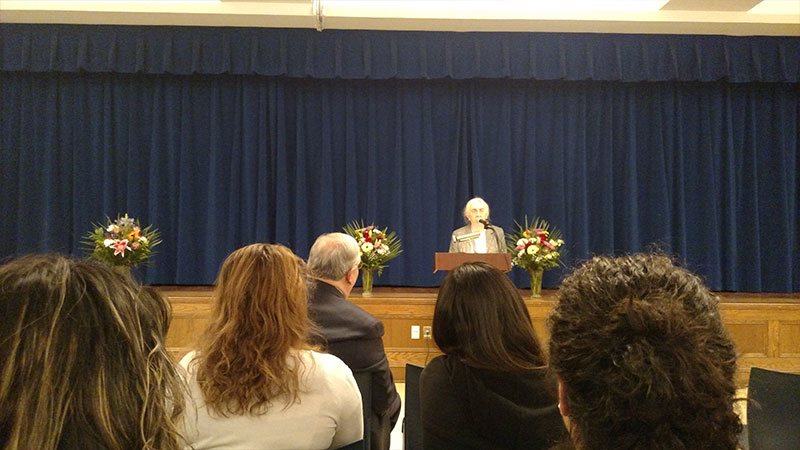BROOKLYN
245 Clinton Ave., Brooklyn, NY 11205
Main: 718.940.5300
Admissions: 718.940.5800
Fax: 718.940.5680
LONG ISLAND
155 W. Roe Blvd., Patchogue, NY 11772
Main: 631.687.5100
Admissions: 631.687.4500
Fax: 631.687.4539
March 14, 2016

As the eighth installment of the annual Dr. Reza Khatib and Mrs. Georgianna Clifford Khatib Lecture series, St. Joseph’s College had the honor of hosting Dr. Kusumita P. Pederson, professor of religious studies at St. Francis College. Having been involved with the international interfaith movement for more than 25 years, Dr. Pederson led a lecture on “Hinduism and Universality in Religion.”
(Photo caption: L-R Thomas Petriano, SJC Professor and Chair of Religious Studies; Kusumita P. Pederson, Professor of Religious Studies at St. Francis College; SJC President Jack P. Calareso)
Introducing our presenter, SJC President Dr. Calareso touched on the importance of promoting interfaith dialogue, noting that education is the greatest tool against ignorance, an ignorance that could be potentially violent. He emphasized that civil and respectful dialogue enriches the liberal education for students and, after having a moment of prayer to "One of many names,” Dr. Pederson was welcomed to the stage to begin her presentation.
Worldview is not a doctrine or dogma but rather exists in all of us and is necessary to function. A religious worldview holds a higher and fuller reality and has no essence but is a causal continuity over time.
In order to understand the depth of Hinduism, Dr. Pederson first stressed the importance of defining Hinduism, religion and universality. Contrary to popular belief, the word "hinduism" is not of Indian descent but rather, of Persian roots. Hinduism was used to refer to the river, both the land and its people, but was later transmogrified to refer to a group of various Indian religions. Many view the concept of having to explicitly categorize a religion as one of Western imposition, which raises the question of what constitutes the boundary between one religion and another — who is qualified to make this decision?

Dr. Kusumita P. Pederson delivers her lecture, "Hinduism and Universality in Religion.”
Dr. Pederson went on to cite Clifford Geertz’s definition of religion, that it is a world view, ethics and a way of life. Worldview is not a doctrine or dogma but rather exists in all of us and is necessary to function. A religious worldview holds a higher and fuller reality and has no essence but is a causal continuity over time.
When discussing the universality of Hindu dharma, it is important to differentiate between both the empirical and philosophical definitions. The empirical definition of universality holds that it is what is found everywhere. Dr. Pederson gave music as an example; is it present in every culture in some form and is a human universal. The philosophical definition, however, states that universality is what is true everywhere. An example of this would be ethics, the universality of human rights.
Evidence of Hindu dharma as a religion dates back to the 1400s, and the religions that fall under it have several common themes: ideas of karma, instructions for yoga, self beyond the individual self, reality hidden by forms of the world, self/form in everything, afterlife in all living things and the microcom of a human being to the macrocosm of the universe.
Swami Vivekananda, a pivotal student and teacher during the Hindu Renaissance in the 19th century, believed that God's design was that there should be many different religions and that varying religions are not contradictory; they are supplementary and should add rather than exclude. Religions are complementary manifestations of a common truth and the heart of every religion is sound, regardless of the dogmas it accumulates.
Concluding her lecture, Dr. Peterson discusses the universality of Hinduism. Despite its ambiguous definition, Hinduism is not exclusive to those from a particular geographical area. In a lesson that can be applicable to all regardless of religious affiliation, Hinduism encourages us to stand at the present and to open ourselves to the infinite future.
Get Social
Get Social